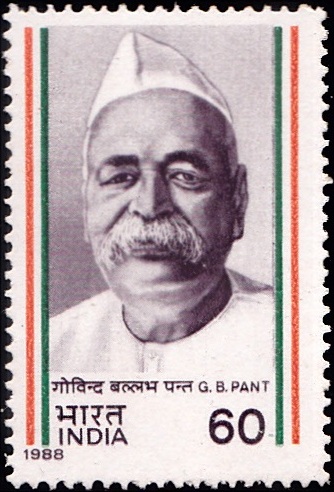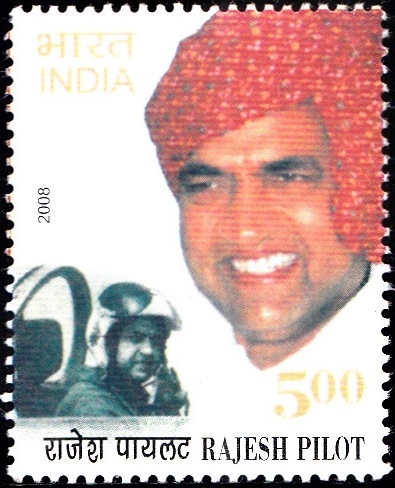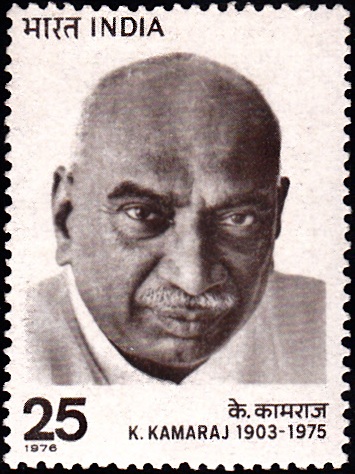
Pandit Govind Ballabh Pant 1965
A commemorative postage stamp on Bharat Ratna G.B. Panth, 5th Minister of Home Affairs of India (1955-61), 1st Chief Minister of Uttar Pradesh (1950-54) and 2nd Chief Minister of United Provinces (1946-50) :

 Issued by India
Issued by India
Issued on Sep 10, 1965
Issued for : The P & T Department feels privileged to bring out a special commemorative stamp on the occasion of the seventy eighth birth anniversary of this great son of India.
Type : Stamp, Mint Condition
Colour : Dark Brown – Olive Green
Denomination : 0.15
Overall Size : 3.91 X 2.90 cms.
Printing Size : 3.63 X 2.62 cms.
Perforation : 13
Watermark : Printed on unwatermarked paper
Number Printed : 2 million
Set : 35 stamps per issue sheet
Printing Process : Photogravure
Designed and Printed at : India Security Press
Name : Govind Ballabh Pant
Born on Sep 10, 1887 at Almora, Uttarakhand, India
Died on Mar 7, 1961 at New Delhi, India
About :
- Pandit Govind Ballabh Pant inherited many traits from the Himalayas whose child he was. His towering personality, his incisive mind, his indomitable will and the dignity of his bearing, all these had something of the Himalayas about them. But behind the formidable exterior was an intensely human individual, kind and warm, generous and forgiving, patient and loyal.
- These remarkable qualities, coupled with an intense patriotism and love for the common man, offer a key to the transformation of a simple village child into one of the foremost leaders of modern India. He was born on September 10, 1887 in Khunt, a tiny village in District Almora, U.P. and brought up in an atmosphere far removed from the currents of national resurgence. He had a brilliant academic career, which he rounded off with a LL.B. degree from the Allahabad University in 1909. He joined the Bar at Naini Tal the same year and soon built up a flourishing practice. He, however, abandoned it in answer to Mahatma Gandhi‘s inspiring call for non-violent, non-cooperation and plunged into active politics in the early twenties. He became a Member of the U.P. Legislative Council in 1923 and was elected President of the U.P. Congress Committee in 1927. A year later he was active in organising demonstrations against the Simon Commission and received serious injuries in a police lathi charge. During the early thirties he was twice imprisoned for participating in the Civil Dis-obedience Movement.
- He became a member of the Congress Working Committee in 1931 and continued to be its member almost uninterruptedly till his death. In 1934 he was elected a Member of the Central Legislative Assembly and also became Deputy Leader of the Congress Party.
- When the Congress accepted office in the provinces in 1937, he was elected leader of the Congress Party in the U.P. Assembly and formed the first Congress Ministry. Even during the short tenure of the Ministry he put through much needed reforms, which greatly benefited the common man. The individual satyagraha movement found him in prison once again in 1940. Hardly had he come out of prison when he was again detained in connection with the Quit India Movement in August, 1942.
- After his release in 1945, Pandit Pant played a leading role in conducting negotiations with the British on behalf of the Congress on the question of India‘s independence. Pantji was re-elected to the U.P. Assembly in 1946 and was again called upon to head the Government of the State. He served as the Chief Minister of U.P. for an unbroken period of eight years. It was under his inspiring stewardship that notable administrative, educational and agrarian reforms, including the abolition of the Zamindari System, were launched. In December, 1954 he was called upon to join the Union Cabinet as Home Minister.
- As Union Home Minister, he showed great skill in handling the intricate and difficult task of States reorganisation and in securing a broad consensus in favour of the official language policy. He took special interest in Kashmir Affairs. As Chairman of the Zonal Councils, he created a forum for hammering out differences between neighbouring States and for co-ordinating development schemes on a zonal basis. He was an outstanding parliamentary figure of his day. He was awarded Bharat Ratna in 1959.
- Pt. Pant lives forever in the hearts of the Indian people whom he served with all his energy and dedication right till his last breath.








[…] of private papers of eminent personalities like Mahatma Gandhi, Rajendra Prasad, Maulana Azad, G.B. Pant, B.R. Ambedkar, M.R. Jayakar, Dadabhai Naoroji, etc. There is also a vast collection of Persian […]
[…] Charan Singh started his ministerial career in 1948 as ‘Sabha Sachiv‘ in the Pant Ministry and was entrusted the Ministry of Justice and Information. In view of his proven ability, […]
[…] Union Cabinet. In March 1958, he became Minister for Commerce and Industry. Later, on the death of Shri Gobind Ballabh Pant, in April 1961, the important portfolio of Home Affairs was entrusted to […]
[…] institute which was built in the memory of the great patriot, freedom fighter and statesman, Govind Ballabh Pant. Its foundation stone was laid in October, 1961 and it was inaugurated on 30th April, 1964 by the […]